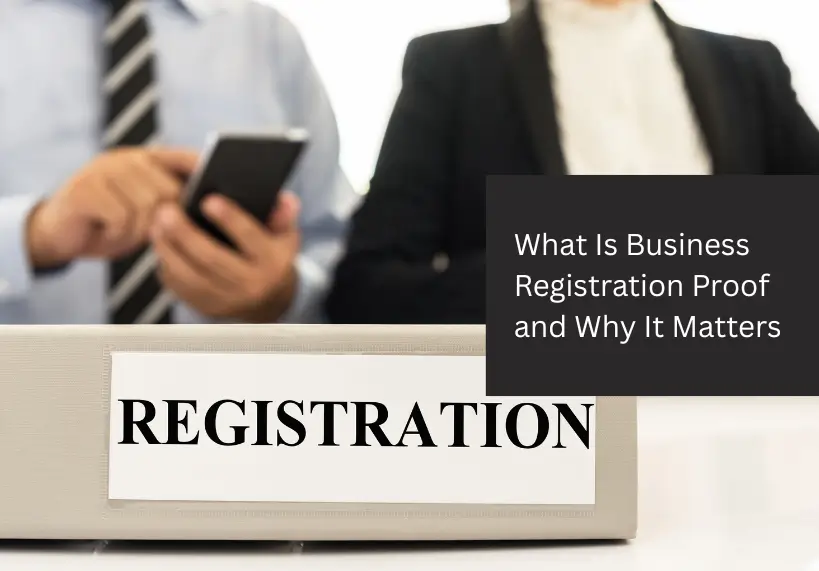
Starting a business in India involves more than just a good idea – it requires official recognition by authorities. Business registration proof consists of the legal documents confirming that your enterprise is formally registered. These documents are not just paperwork; they are the foundation of compliance and growth.
As one source notes, registration proof is “beyond paper; it is a necessity to unleash growth, compliance, and opportunities. In other words, business registration proof (such as a Certificate of Incorporation, GST certificate, or shop license) verifies that your business exists legally. This proof is essential for opening bank accounts, applying for loans, and meeting tax or regulatory requirements.
What Is Business Registration Proof?
Business registration proof is any official document showing that your business is legally established and allowed to operate in India. For example, companies and LLPs receive a Certificate of Incorporation from the Registrar of Companies (RoC) via the Ministry of Corporate Affairs (MCA).
This certificate includes the company’s name, registration number, and date of incorporation. Similarly, a sole proprietorship may obtain a trade license or Shops & Establishment license from local authorities as proof of its existence.
In short, any government-issued certificate or license that confirms your business structure and registration acts as business registration proof. Having these documents in order is critical: without them, your business may not be recognized as a separate legal entity and could lose credibility with customers, banks, and regulators.
Types of Business Registration Documents
Common types of registration proof include certificates issued by the government for different business structures and activities. In India, the exact documents you need depend on your business type and industry. Common business registration documents include:
1. Certificate of Incorporation (Company/LLP Registration Certificate)
Issued by the RoC through the MCA portal, this document officially confirms that your company (private, public, LLP, one-person company, etc.) is registered. It contains details like your business name and registration number.
2. GST Registration Certificate
If your turnover exceeds the statutory limit (usually ₹20 lakh in most states), you must register for GST. The GST certificate is both a tax registration and business proof document.
3. Udyam (MSME) Registration Certificate
A free online certificate for micro, small and medium enterprises. Udyam registration proves your business is an MSME and can help you access priority loans and government schemes.
4. Shops & Establishment License
Required if you run a shop, restaurant, or commercial establishment. Issued by state or local authorities, it certifies that your business premises comply with local labor laws.
5. Municipal Trade/Factory License
Depending on state laws, businesses (like factories or workshops) may need a factory license or trade license from the municipal corporation. For example, a “Gumastha” license in Maharashtra confirms legal operation in that city.
6. Import Export Code (IEC)
Mandatory for any business engaged in international trade. This 10-digit code from the Directorate General of Foreign Trade is proof that your firm can import or export goods.
7. FSSAI License
For food-related businesses (restaurants, food manufacturers, caterers, etc.), an FSSAI license/certificate is required. It shows compliance with food safety regulations.
8. Partnership Deed
For partnerships, the registered partnership deed acts as proof of business registration. (While not a government certificate, it is a notarized legal document detailing the partnership.)
9. PAN and TAN
These are tax identifiers (Permanent Account Number and Tax Deduction Account Number). Though not “registration certificates” per se, banks and government agencies often require PAN/TAN along with your registration proof for transactions and tax filings.
These documents collectively serve as evidence of your business’s legal existence. As one FAQ notes, common proofs include the Certificate of Incorporation, PAN card, GST certificate, Shops & Establishment license, partnership deed, and Memorandum/Articles of Association for companies.
Why Business Registration Proof Matters
Legal registration and certification are not optional if you want to grow your business. Registered status brings several critical advantages:
1. Credibility and Trust
Official registration signals to customers, vendors, and investors that you are a legitimate, law-abiding business. Trust is built when an organization has proper registration proof.
2. Access to Financial Services
Banks and lenders require registration proof. You can’t open a business bank account or get a loan without it. In fact, every time you apply for a current account, loan, or government grant, you’ll need to show proof of registration.
3. Legal Compliance
Many laws (Companies Act, GST Act, Shops & Establishment Act, etc.) mandate registration. Operating without the required registration can incur fines, penalties, or even business closure.
4. Tax Benefits and Compliance
Registration enables you to file taxes legitimately. For example, only registered businesses can claim input tax credit under GST. There are also tax incentives (like exemptions for new startups) available only if you have the proper certificates.
5. Government Schemes and Subsidies
Eligible schemes and priority lending programs (e.g. collateral-free MSME loans) are accessible only to formally registered businesses. Unregistered firms cannot take advantage of these benefits.
6. Business Expansion
To enter new markets or bid on contracts, you often need registration proof. Joint ventures and government contracts typically insist on seeing genuine business registration certificates.
In practice, this means registered businesses can secure funding and grow more easily. For instance, LoanTap offers tailored loan products for registered entrepreneurs. LoanTap’s Business Loan provides up to ₹10 lakh for expansion or working capital, with minimal documentation.
Its MSME Term Loan is collateral-free, helping small registered firms get funds fast. Likewise, a Working Capital Loan from LoanTap can cover daily expenses (loans range ₹50,000–₹5,00,000) once you have your registration documents in place. By meeting the registration requirements, entrepreneurs unlock these financing options and other growth opportunities.
How to Obtain a Business Registration Certificate
Registering your business in India is largely done online through government portals, but the exact process depends on your business type:
1. Choose a Business Structure
Decide if you will operate as a sole proprietorship, partnership, LLP, private limited company, etc. This determines where you register.
2. Apply on the Relevant Portal
- For companies/LLPs, use the MCA portal. You’ll need digital signatures (DSC) and director IDs (DIN) for the application.
- For MSMEs, use the Udyam Registration portal (udyamregistration.gov.in). This is free and just requires your Aadhaar and PAN.
- For a sole proprietorship, register under the Shops & Establishment Act via your state’s labor department website, or obtain a Trade License from your municipal office.
3. Prepare Documents
Commonly needed documents include identity proof (PAN, Aadhaar), address proof, and specifics like Memorandum of Association (MOA) and Articles of Association (AOA) for companies. (Partnerships need a partnership deed.) Follow the guidelines on the portal for required forms.
4. Submit and Pay Fees
Upload your documents and pay the nominal registration fee (if applicable). For example, company registration on the MCA portal involves a filing fee, whereas Udyam registration is free.
5. Receive the Certificate
Once the government reviews and approves your application, you will receive the registration certificate (e.g. Certificate of Incorporation on MCA, Udyam certificate online, etc.). This is your official proof of registration.
Following this process ensures you obtain the registration certificate needed for compliance. With these certificates in hand, you can confidently expand your business or apply for financing. For example, after registration you might explore LoanTap’s digital MSME loans or other products to fund your next big step in business.
Conclusion
In summary, business registration proof in India means holding the necessary certificates and licenses that verify your enterprise is legally registered.
Whether it’s a Certificate of Incorporation from the MCA, a GST certificate, a Udyam certificate, or a local trade license, each document has significance. These proofs build trust, enable banking and credit facilities, ensure legal compliance, and unlock tax and government benefits.
Entrepreneurs should therefore register their ventures properly before pursuing growth. Once you have the right proofs, you become eligible for financial support; platforms like LoanTap can then provide tailored [business loans], [MSME term loans], or [working capital loans] to registered businesses, helping turn your plans into reality.
In short, registering your business and obtaining the correct certificates is the first step to accessing credit and growing. With registration in place, you have the credibility and legal standing to scale confidently, and financial partners like LoanTap are ready to support your growth.
FAQ
1. What documents serve as business registration proof in India?
A. Common proofs include: the Certificate of Incorporation or company registration certificate (from the RoC), GST registration certificate, Udyam (MSME) registration certificate, Shops & Establishment license, Import-Export Code (IEC), FSSAI license (for food businesses), and a partnership deed for partnership firms. These documents officially confirm your business’s legal status.
2. Why do banks and lenders require a business registration certificate?
A. Banks need registration proof to ensure your business is legally formed and separate from personal affairs. Without it, they cannot open a current account or extend credit. As noted, before a bank provides a facility, you must produce “proof that you are registered”. This protects both you and the bank and complies with RBI and regulatory guidelines.
3. Is business registration mandatory in India?
A. Yes, under various laws. For example, any company or LLP must register with the RoC. Businesses exceeding GST turnover limits must register under GST. Shops and factories must register under local Shops & Establishment or Factory Acts. Operating without required registration can incur penalties or closure.
4. What happens if I operate without registering my business?
A. Running a business without registration is risky. Unregistered firms cannot legally enter contracts, may be ineligible for loans or government schemes, and face fines or other penalties. In practice, lack of registration means no formal bank account or credit, making it hard to grow. It’s best to register as early as possible to avoid these issues.
5. How do I register my business and get a registration certificate?
A. The process depends on your business type. Generally: (1) decide on a structure (e.g. sole proprietorship, partnership, company, etc.), (2) apply on the relevant portal – the MCA portal for companies/LLPs, the Udyam portal for MSMEs, and local/state portals for shops or trade licenses, (3) upload required documents (ID, address proof, MOA/AOA or partnership deed, etc.), (4) pay fees, and (5) receive the official certificate (e.g. Certificate of Incorporation). After successful verification, the government issues the business registration certificate. This completed certificate is your official proof that the business is registered.








